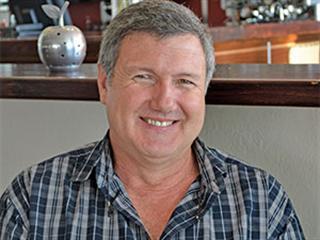
How do you view South African agriculture and the environment from an environmental perspective?
Firstly, I need to say South African farmers should be proud of themselves. They are responsible for more than half of the agricultural products produced in Southern Africa. With that said, the environmental future doesn’t look too bright. One of the country’s biggest challenges is feeding our ever-growing population. South Africa has 52 million inhabitants and projections show that this figure will be 82 million by 2035.
These people will also put more strain on energy and water resources. Furthermore, we are faced with the realities of climate change, land erosion (400 million tons of land is lost annually), water pollution and shortages, a decline in land potential and a deterioration of biodiversity. In SA, 10% of our birds, 20% of mammals and 13% of plants are listed as endangered species.
So it all boils down to the basic economic problem – infinite requirements that need to be satisfied by finite resources. What types of energy demands are we looking at?
Globally, the world will require 53% more energy in 2035 than it did in 2008 to sustain moderate economic growth. About half of the energy we’ll see in the near future will be renewable. China is especially steering away from fossil fuels. On the other hand, India will be the largest global consumer of fossil fuels. This makes SA a perfect supplier due to our location in relation to this south Asian country.
Although experts are aware of the fact that SA’s coal reserves will eventually deplete, they are still harvesting this rich source of income. On 27 February, the SA Coal Roadmap Steering Committee made a presentation to the Fossil Fuel Foundation of Africa. The presentation focused on the manner in which members of the committee thought our coal reserves could best be exploited in the coming decades.
Giant mining companies, leading scientists and officials from various government departments form part of this committee. The only role player not represented is agriculture. More should be done by this sector to become engaged because decisions taken today determine the farming landscape of tomorrow.
Fossil fuels encompass more than just coal. Probably being one of the biggest driving forces behind economic growth, how does oil influence the future of farming in SA?
If we continue on the path we’re currently on, predicted oil prices for 2035 stand at around $200 a barrel. Being less dependent on oil, prices could drop to $50 per barrel. The most likely reference price is, however, estimated at around $125 per barrel. Many farmers are upset by the recently-implemented minimum wage for farm workers. However, before you decide to mechanise you should take these realities into consideration. Mechanisation costs will probably skyrocket in future. Supplies of oil and gas are essential to modern agricultural techniques and the production of fertiliser. Therefore, a serious rise in the price of crude oil will cause an increase in food prices with the potential of famine in coming decades.
What about alternatives like natural gas. Fracking, for example?
Predictions show that the demand for gas (shale and tight bed gas and coal methane) will skyrocket in coming years and this isn’t something to be ignored. Whether we like it or not, fracking will take place. An area of 90 000 km2 has been identified for hydraulic fracturing. Huge volumes of water will be needed for this type of exploration and there is a major chance that groundwater will be polluted in the process.
Fracking has been banned in numerous areas of the US due to the pollution that might occur during the process. In short, the influence of this type of exploration could ruin farming in the nearby vicinity. Therefore, farmers shouldn’t blindly embrace fracking. It would, however, be foolish to refuse to negotiate with relevant role players and suggest an alternative. Maybe farmers should decide on a piece of marginal land that could be sacrificed for fracking. That way, we could keep areas with a higher yielding capacity. Without co-operation we don’t have a fighting chance.
You mentioned water pollution. What could farmers expect in terms of the future of this scarce resource?
Water volume as well as the biological and chemical qualities of water should be taken into consideration. In 2025, SA won’t have enough water to satisfy its citizens’ basic demands. Namibia, Angola and Botswana could be deserts within 30 years. This could be a threat to national security but farmers could also see it as an opportunity to expand their market share.
Biological water quality refers to biological waste present in water. Sewerage plants are supposed to ensure that this type of waste is cleared up. Unfortunately, many sewerage plants aren’t running properly. Almost a third are labelled as dangerous, while 66% urgently require maintenance. Furthermore, 35% of our sewerage plants are outdated and half don’t have trained personnel.
The macro water situation is cumbersome. Water that used to flow into the Orange River is now diverted to the Vaal River system in order to supply the growing demand from Gauteng. The Vaal water is then re-used again and again, which leads to heavily polluted water. During floods, the water ends up in the lower Vaal region and then flows to the lower Orange region where it negatively impacts agriculture. From a farming point of view, there is a direct correlation between water quality and yield.
Chemical water quality refers to things like heavy metals found in water due to upstream mining activities. Growing coal mining activity in the catchment areas of the Vaal and Olifants Rivers in Mpumalanga has led to polluted headwaters. I’ve measured samples at mining sites where the water has a pH level of 1. Therefore, organised agriculture should make it a priority to be involved in any strategic decisions taken. Water quality has already declined to such an extent that the European Union is considering placing a moratorium on food exports from SA. The country’s looming water crisis is bigger than the Eskom debacle and sewage is one of the biggest reasons for this. Let’s face it, you can survive without electricity but not without water.
Another hot topic around the environment is climate change. What should farmers expect?
We don’t know what to expect. Remember the world is billions of years old and we only have data for the past 400 000 years. While we can say with certainty that we’re observing a change in weather patterns, we’re not sure if the world will become hotter or colder. Yes, we can observe an increase in temperature. Melted glaciers are a testimony to that. However, when we analyse data gathered through the analysis of ice cores at Vostok (Russia), it would seem that we’re probably on the verge of an ice age.
This is what we have noticed: There is more extreme weather being observed. There have been more extremely hot and cold days observed than ever before. We’ve also noticed an incline with regard to the number of floods we’ve had in the past couple of years. Due to this, farmers should brace themselves to cope with more droughts, floods, extreme heat and cold than before. Change seems to be the only certainty.
Contact Prof Kobus van der Walt on 018 299 1584 or at [email protected]













